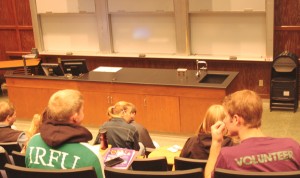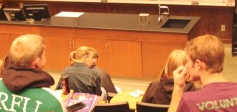Given the choice, would you rather preserve your academic integrity or be accepted into your dream school? According to a New York Times article , students at Stuyvesant High School, a New York City flagship public school, chose the latter and began using methods of low-level cheating, including sharing and copying homework.
Kristie Bunton, associate dean of the College of Arts and Sciences, has handled 10 cheating reports so far this school year at St. Thomas; most of them cases of plagiarism, where students took exact Internet content and used it in their own assignments.

Bunton said most cheating cases don’t get reported because professors choose to deal with it on their own without ever bringing it to her office.
“I think in many instances a professor may use it as a teachable moment with a student and sit down and go over the issue with a student,” Bunton said.
Bunton said cheating patterns often correlate with course level and are not usually directly related to a student’s academic year in school.
“We get more (cheating) reported cases in the lower level general education courses,” Bunton said. “By the time you get to a 400 level class, those classes are very specialized, and it may be much harder to cheat in those.”
Bunton said in a first offense of academic dishonesty at St. Thomas, an instructor reports the case and recommends a penalty, such as a failure on the assignment. In a second offense, the student is required to meet with the appropriate dean. At that point, the recommendation can be anything from the professor’s recommended penalty all the way up to an automatic failure in the course.
Raymond MacKenzie, English professor and director of renaissance program minor, said he’s frustrated with cases of cheating.
“One ends up relying on people’s basic decency and their understanding that they’re wasting their own money here spending all this tuition money and just cheating their way through the course,” MacKenzie said.
To help prevent cheating, some professors use a tool called SafeAssign, which is connected to Blackboard. Students upload their paper and run it through the program. SafeAssign will then show students and professors sections of the paper that are thought to be plagiarized. Students can fix those sections and submit it again with a corrected report.
Sophomore Russell Smith said he does not see the point in cheating.
“You cheat now and you get to where you want to go, but you didn’t get there on your own means,” Smith said.
Bunton said she believes one of the reasons students cheat is because they are lazy.
“My sense is that maybe they think they’re not going to get caught, and they’ll just take a shortcut this once,” Bunton said. “I think they think sometimes it’s not cheating.”
Bunton explained that when students take shortcuts they are not only being disrespectful toward the professors, but also fellow students and the university.
“It’s really sad because our fundamental principle of our academic endeavor is integrity; that you and I will both be truthful and we will work together in our class to learn and to explore new ideas,” Bunton said. “And when you take shortcuts, that’s cheating, that’s lying, that’s dishonest.”
Sophomore Nicole Lopez said it is difficult to regulate different levels of academic dishonesty.
“I think that some level of cheating occurs, but in more extreme cases, it isn’t right,” Lopez said. “For example, programming your calculator is low-level cheating but it occurs so frequently that it’s not really a problem. But say, having someone write your essay is not good.”
Freshman Ryan Burke said students find ways to justify cheating.
“It’s easier to do with daily assignments. There’s a lot of cheating with daily work that should’ve been done solo,” Burke said. “It’s easy to collaborate.”
Smith said cheating is a waste of time and does not necessarily work out in the end.
“You have some people taping the answers to the back of their water bottles to get a better grade on the test. They’re digging themselves in deeper holes,” Smith said. “You get a good grade and you keep moving up and you don’t know anything by yourself.”
Bjorn Saterbak can be reached at sate3878@stthomas.edu.



